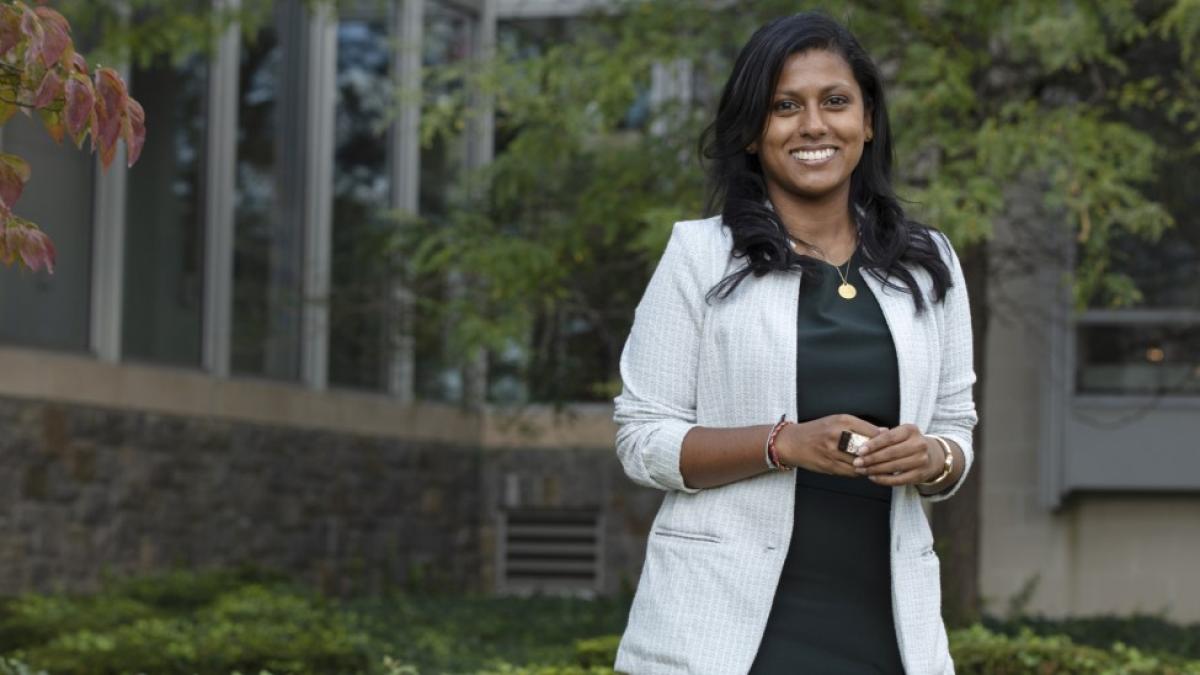Pleasantville, NY — Pace University’s College of Health Professions (CHP) proudly welcomed two distinguished keynote speakers for its winter graduation recognition ceremonies in Pleasantville on December 18: Andrea Dalzell, RN, known nationally as The Seated Nurse, for the Accelerated Bachelor of Science in Nursing (ABS) Pinning Ceremony and esteemed scholar Michael Iwama, PhD, MSc, BScOT, for the Occupational Therapy (OT) program.
Pamela Guerrero '23: A Passion for Social Justice
A first-generation US Citizen, Pamela Guerrero entered law school with a passion for social justice and immigration law. Throughout law school, she followed that passion by participating in Haub Law’s Access to Justice Seminar, the Access to Justice Lab, and the Immigration Justice Clinic. As a 3L, Pamela was awarded a prestigious Immigrant Justice Corps Fellowship post-graduation. Today, she is following her dreams as she works with the Refugee & Immigrant Program of The Advocates for Human Rights.
“I am a first-gen US citizen from Dominican parents who originally moved to Washington Heights, Bronx, New York, but then settled in Westchester. I came to law school because I learned of many socioeconomic inequities in the US while attending undergraduate school and wanted to be in an advocacy position to be able to address these issues. I was especially concerned with the immigration system in this country and wanted to become an immigration lawyer to provide newly arrived children and adolescents with the protection they need to thrive in the US. Geographically, Haub Law was the perfect place for me and academically I was impressed with the variety of diverse learning opportunities. The Immigration Justice Clinic and both the Access to Justice Seminar and Access to Justice Lab at Haub Law were integral in fostering my passion for immigration law and social justice.”
Pamela was an inaugural student participant in the curricular components of the Pace Access to Justice Project (Pace A2J), which is housed and coordinated within Haub Law’s Public Interest Law Center. Pace A2J serves as a hub for community collaborations, programs, scholarship, policy initiatives, and hands-on innovative academic and non-credit bearing experiential law student and alumni opportunities. The A2J Seminar provides students with an opportunity to hone in on their critical thinking, research, writing, and editing skills required for legal practice – all as related to an access to justice/social justice issue of the student’s choice. Whereas, the A2J Lab provides law and computer science and design students an opportunity to collaborate on a social justice/access to justice concerns and provide a real life solution to these issues. Pace A2J is designed to more actively engage students in learning about and contributing to real-world efforts to address the access to justice gap and Pamela feels that it does just that. “Participating in both the Access to Justice Seminar and Access to Justice Lab improved my educational experience, because it gave me a way to tangibly utilize the law for the general betterment of society,” said Pamela. “A lot of academic work in law school is very theoretical, which creates a disconnect between what is being taught and actual legal problems that exist outside of the academic setting. Both the A2J Seminar and A2J Lab bridged that gap by having participants use the law to create an application that could potentially be used by actual people in the future, having a tangible benefit to them.”
“A lot of academic work in law school is very theoretical, which creates a disconnect between what is being taught and actual legal problems that exist outside of the academic setting. Both the A2J Seminar and A2J Lab bridged that gap by having participants use the law to create an application that could potentially be used by actual people in the future, having a tangible benefit to them.”
In addition to the hands-on educational experience that Pamela feels Pace A2J provided, she notes that the interdisciplinary Lab, where students designed a tool to address low-income tenant habitability rights, was a notable curricular innovation. The Lab was co-taught by Professor Elyse Diamond at Haub Law and Andreea Cotoranu, Clinical Professor and Director of the NYC Design Factory in Pace University’s Seidenberg School of Computer Science and Information Systems. Pamela notes, “I learned from collaborating with computer science and design students from Seidenberg students that it's not enough to simply have an idea . . . it is also important to address possible limitations such as tech limitations. It was extremely valuable to have varying expertise and perspectives throughout the Lab and I feel we came up with a better end result because of this.”
Pamela remains committed to social justice issues today and credits Pace A2J with cementing that commitment. “My participation in the Access to Justice Seminar and Access to Justice Lab reconfirmed my commitment to interdisciplinary social justice work by reminding me that many social issues are interconnected. Housing problems are very relevant to my current position as an IJC Fellow, because a lot of court notification is reliant on if a client has a stable address and a lot of client's worry about housing first before anything related to immigration work. Addressing injustice in housing is a huge step in immigration work since it gives clients a chance to thrive in a stable environment as they prepare for their ongoing immigration case.”


